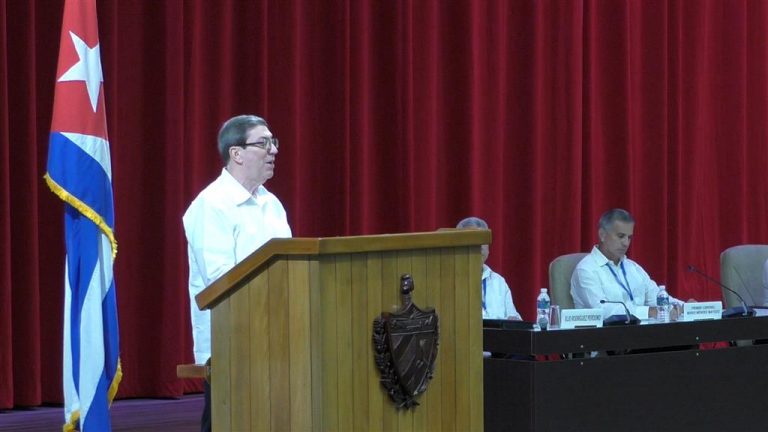At the opening of the event, which is being attended by some 400 nationals who reside in more than 50 countries and being held at Havana’s International Conference Center, Rodríguez assured that it is “the result of the talks that began in November 1978, promoted and driven by the Commander-in-Chief of the Cuban Revolution, Fidel Castro Ruz.”
He recalled that at that time, the Cuban Revolution was in a clear process of consolidation and institutionalization 20 years after its triumph in January 1959, and added that Cuba had expanded its ties with the world and had broken the siege of isolation that imperialism tried to impose.
There was a less aggressive climate by the Government of the United States. At the same time, our government was developing a reflection on the need to reestablish ties with those Cubans who for several reasons had left the country, especially to the United States, and who, regardless of their political stance, had the desire to return or establish contacts with the homeland and with their families, he said.
Rodríguez pointed out that under these circumstances, our Government’s policy took shape and from the beginning until today, it has been developed under difficult and extraordinary conditions, which are not common in the case of the ties of other countries with their emigration.
In our case, the nation has remained under the permanent aggression of a big power, located only 90 miles away and where the majority of emigrants reside or are citizens.
The head of Cuban diplomacy indicated that there is a very concentrated presence in a community in which a certain degree of hostility is expressed, encouraged, driven or manipulated, even electorally, against their homeland.
“As a result of this constructive approach and historic development, notable progress has been made and important decisions and measures have been adopted gradually to strengthen our ties,” he said.
Rodríguez recalled that the two conferences held in 1994 and 1995 made it possible to deepen rapprochement, expand the composition of participants from several countries in the talks, not only from the United States, as well as design the rapprochement and policy to incorporate the ten emigrants into a better structure and greater institutionality in national life.
After saying that something similar happened with the 2004 conference, the foreign minister pointed out that consular or immigration measures have played a key role in facilitating procedures and reducing requirements, reducing expenses, eliminating obstacles to increase communication and promote family ties.
Among the most visible results are the growing demonstrations of support and solidarity with Cuba from nationals who reside abroad, including in the United States.
In this regard, Rodríguez pointed out that many of them are subjected, as well as their family, friends, neighbors, acquaintances and Cubans in general, to permanent toxic aggression through the media and digital networks, with platforms based especially in South Florida, and financed by governmental institutions.
“It is an aggression that we know that it often exposes you to several dangers and our people admire how you nobly defend your moral and political position in the face of harassment,” Rodríguez stressed.
He noted that the participation of Cubans who live outside the country in national life is increasingly more active and expressed in the economy and commercial activity, while opportunities are expanding for a growing role of these compatriots in the development of the country, Rodríguez pointed out.
Our culture is one, it is illustrated in the thought and artistic and literary creation of all, in the development of science and academic life, in the exercise of sports and in other facets of national life, he highlighted.
The diplomat added that our history tends to overcome the concept of emigrants with that of the Cubans who we are and come and go in their different circumstances, participate and contribute, defend and enrich, return or continue in their children, their grandchildren, their great-grandchildren who will continue to be Cubans.
It is Martí’s formula of triumphant love, inscribed in blood on the flag of the lone star, exalted Rodríguez, who asserted that the neo-annexationists will not be among us.
He stated that in the patriotic Cubans who reside abroad, the nation grows, enriches itself, manifests itself and proudly presents itself to the world, increasingly wherever there is a Cuban who carries in his soul the feeling of the homeland.
In Cuba, there is the maternal substance, the origin, the essence, it is the people and there is the history that belongs to all Cubans, he commented.
“Our Cuban traditions are nourished from the island’s entrails, which means Cuban traditions and awareness of what we are and want to be, and from here the strength of the nation and Cuban culture emanates. We are honored that they are in the homeland at this meeting,” he concluded.
jg/omr/lam/ale










